Losing Culture by David Berliner Dominic Horsfall

Author:David Berliner, Dominic Horsfall [David Berliner, Dominic Horsfall]
Language: eng
Format: epub
ISBN: 9781978815377
Barnesnoble:
Publisher: Rutgers University Press
Published: 2020-05-15T00:00:00+00:00
Here, Sapirâs exonostalgia intertwines with that of his interlocutors, who have been exterminated by the American colonists.
In most of these founding texts, the style, condemning the ravages of colonization and globalization, is pre-apocalyptic. There is an evolutionist temporality that pervades their words.27 In particular, in the works of Malinowski, Boas, or Marcel Griaule, the position of the anthropologist in the narrative is that of a powerless observer, the herald of impending cultural disaster. While these peoples were perceived as the last survivors of a bygone age, the anthropologist became the last witness to these paradises being led inexorably toward their doom. I am particularly fond of Ramon Sarróâs likening of ethnography to âthe art of being lateâ28 to describe the disappointment felt by the first anthropologists arriving in the field just as traditional systems appeared to be crumbling; they were arriving too late.
This feeling of arriving too late is reminiscent of Vladimir Jankélévitchâs fine words on the âcomplacency to the irreversible,â29 this âimpotency before the inevitable.â30 When resisting the irreversible becomes impossible, these two words alone express the âbitterness of regret.â31 Like a doctor watching a patient in agony, the nostalgist feels powerless before the passage of time, as was the case for many anthropologists. Some of them felt outrage and a sense, no doubt, of personal loss. They took to politics to advocate for these peoples, to fight against the prevailing discourse that traditional societies had always been savage and had nothing to offer the modern world. For them, the trope of the âdisappearing savageâ constituted a political allegory intended to garner public recognition for these groups, a posture of militant exonostalgia. Other anthropologists developed a discursive interest for an object they believed to be in decline, without necessarily expressing strong feelings of nostalgia. However, militant or not, this exonostalgia fueled their scientific activities; they began to archive and collect ethnographic data (referred to by some as âsalvage ethnographyâ). Simultaneously a fear of loss and a theoretical perspective, this exonostalgia very quickly became institutional practice in university faculties, becoming embodied in the collections of objects of museums,32 to the point of nowadays being deployed by UNESCO experts.
Download
This site does not store any files on its server. We only index and link to content provided by other sites. Please contact the content providers to delete copyright contents if any and email us, we'll remove relevant links or contents immediately.
Cecilia; Or, Memoirs of an Heiress — Volume 1 by Fanny Burney(32558)
The Great Music City by Andrea Baker(32018)
Cecilia; Or, Memoirs of an Heiress — Volume 2 by Fanny Burney(31956)
Cecilia; Or, Memoirs of an Heiress — Volume 3 by Fanny Burney(31941)
We're Going to Need More Wine by Gabrielle Union(19046)
All the Missing Girls by Megan Miranda(16026)
Pimp by Iceberg Slim(14506)
For the Love of Europe by Rick Steves(14121)
Bombshells: Glamour Girls of a Lifetime by Sullivan Steve(14075)
Talking to Strangers by Malcolm Gladwell(13370)
Norse Mythology by Gaiman Neil(13363)
Fifty Shades Freed by E L James(13239)
Mindhunter: Inside the FBI's Elite Serial Crime Unit by John E. Douglas & Mark Olshaker(9342)
Crazy Rich Asians by Kevin Kwan(9291)
The Lost Art of Listening by Michael P. Nichols(7506)
Enlightenment Now: The Case for Reason, Science, Humanism, and Progress by Steven Pinker(7313)
The Four Agreements by Don Miguel Ruiz(6765)
Bad Blood by John Carreyrou(6621)
Weapons of Math Destruction by Cathy O'Neil(6279)
